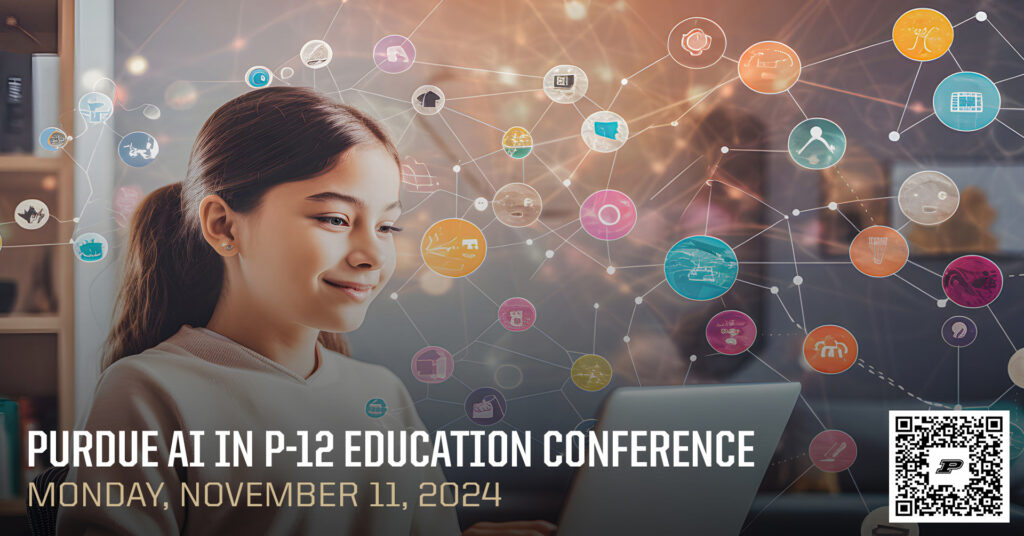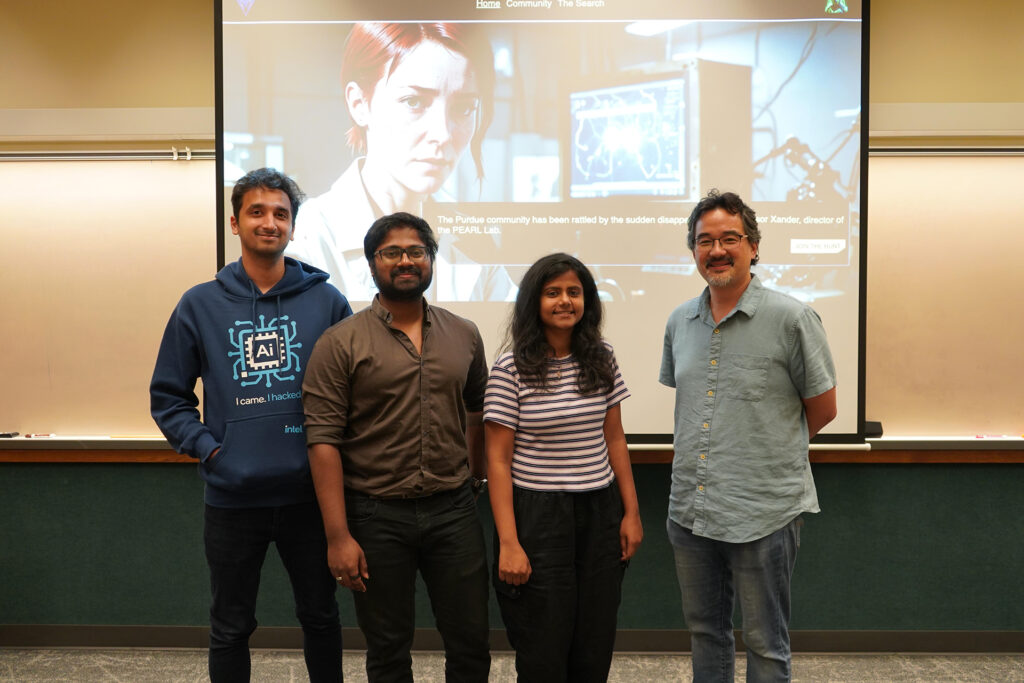Inaugural Purdue AI in P-12 Education conference “Convergence” coming Nov. 11
The first annual Purdue AI in P-12 Education Conference, “Convergence,” will take place on Nov. 11, 2024, at Purdue University.

Held by the College of Education, the conference will focus on how pedagogy and use of artificial intelligence (AI) must change to accommodate and/or leverage the availability of generative AI for education.
AI is a key focus of Purdue Computes, a strategic Purdue University initiative to further scale Purdue’s research and educational excellence.
“I settled on the theme of ‘Convergence’ because AI, while not new, has thrust itself so quickly into our everyday lives that schools are finding themselves a bit in the ‘wild wild West’ in adapting to its sudden ubiquity,” said William (Bill) Watson, conference organizer. Watson heads the College’s Artificial Intelligence/Data Science Initiative (part of Purdue Computes), directs the Purdue Center for Serious Games and Learning in Virtual Environments, and is a professor in the Department of Curriculum and Instruction’s Learning Design and Technology Program.
“’Convergence’ also reflects the need for all of us to come together and start agreeing on AI’s appropriate and most effective use,” he added.
The conference will focus on helping teachers and administrators learn more about artificial intelligence in order to better understand its potential to enhance personalized learning and improve student outcomes. (See Schedule and register online by Nov. 8 at https://bit.ly/24ai-in-ed-registration or in-person at the conference.)
“Much as using the Internet has become commonplace in P-12 classrooms, so too will the use of AI,” said Phillip J. VanFossen, interim dean of the College. “Familiarity with AI tools can also help educators and administrators integrate technology effectively in the classroom, streamline administrative tasks, and prepare students for a future where AI plays a significant role in various fields.”
“We are excited to share our research with teachers and others, but also to learn from our teacher colleagues on the ground in the schools grappling daily with the both the prospects and the challenges of AI in education,” said Wayne E. Wright, associate dean for research, graduate programs, and faculty development.
The conference came about because Watson, VanFossen, and Wright felt that the College’s expertise could provide important professional development by offering a conference on the role of AI in P-12 schools – something everyone is scrambling to better understand.
Watson said that the College of Education has a history of service and engagement within the P-12 community through its Indiana STEM Education Conference held for the past ten years by the Center for Advancing the Teaching and Learning of STEM (CATALYST), its groundbreaking Indiana GEAR UP grant, its Center for Literacy and Language Education and Research (CL2EAR) for literacy services, its Purdue Center for Rural Research, Education, and Outreach programs, and its Gifted Education Research and Resource Institute (GER2I) camps which the community and people around the world send their gifted children to, as well as many other education initiatives and programs.
AI, like any technology, brings with it potential for ineffective or even harmful implementation, according to Watson.
“It has the potential to truly be transformative in moving learning towards a more personalized and competency-based paradigm that focuses on critical thinking, problem solving and meeting each learner where they are,” he said. “AI can help them to learn in an optimally effective way rather than forcing learning deficiencies by focusing on the calendar and seat time as opposed to what they know and can do.”
The keynote speaker will be Dr. Stephen J. Aguilar of the University of Southern California’s Rossier School of Education. His research focuses on investigating how educational technologies – both emerging and established – influence teaching, learning, and motivation. Aguilar studies the impact of generative AI in educational settings, the digital equity gap, and learning analytics applications, and is co-leading USC’s new Center for Generative AI and Society’s efforts to understand when and how generative AI is used by students and instructors in post-secondary settings.
“I am impressed by his balanced treatment of technology and his focus on diverse learners, policy, and such issues as digital equity when considering educational technologies,” Watson said.
The conference will offer resources and strategies to promote student learning and further teacher development, as well as over 50 presentations on AI for curriculum development, school AI policy, bias, privacy and AI, and AI and education research. Attendees may network with AI vendors and teacher attendees will earn Professional Growth Points (PGPs).
Watson is grateful for the collaboration of College of Education faculty and students who helped organize the conference and will give a variety of presentations, and for P-12 teachers who will share what they’ve learned through their own experiences implementing AI in schools.
“We have some wonderful sponsors for the conference including NextTech, a non-profit which specializes in professional development in technology education for Indiana teachers, as well as MagicSchoolAI and ColleagueAI, AI platforms for teachers and schools, in addition to others who will be at the conference to engage with our attendees and further explain their services,” Watson said.
A complementary activity leading up to the conference was to help graduate students design “a game about AI using AI.” In the spring of 2024, Watson’s Educational Game Design (EDCI 556) graduate students Hassaan Waqar, Ivy Abraham, and Kireet designed an Alternate Reality Game (ARG) called Transforming AI for Learning (TRAIL). It’s an online transmedia escape room with a mystery around a narrative that participants try to solve. Game participants learn about AI via the game and actually use AI tools while solving the mystery. Besides being fun, the game is also designed to educate participants about AI and involve them on envisioning the future of AI at Purdue.

After the conference, what are the next steps? Watson and his team hope to make it an annual event at Purdue and will gather attendees’ feedback to inform and plan a second conference next year.
“It is imperative that our society, and most importantly the teachers and administrators tasked with educating our children engage in important conversations around how AI should and should not be used and how to leverage its potential while guarding against its misuse,” said Watson.
About the College of Education’s AI/Data Science Initiative
We offer courses, graduate certificates, and degree programs that provide training for students in the analyses of large sets of numerical, textual, and multimodal data and practical applications of AI tools. We are leveraging our comparative advantage in P-12 education to provide professional development and training to our school-based colleagues. Our faculty scholars, centers, and funded grant projects engage in interdisciplinary research to leverage AI tools and to collect and analyze data that seeks to transform learning and teaching, inform policy, and make a difference in the lives of culturally and linguistically diverse students, families and communities.
Source: Bill Watson, brwatson@purdue.edu
Upcoming AI in Education events:
- Purdue AI in P-12 Education Conference (Nov. 11)
Register online by Nov. 8 at https://bit.ly/24ai-in-ed-registration or in-person at the conference. - The AI Imperative: Uniting Education, Business and Government summit (Nov. 14)
- Play Transforming AI for Learning (TRAIL)